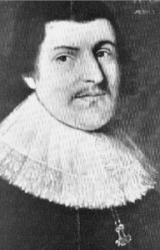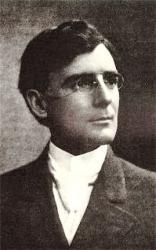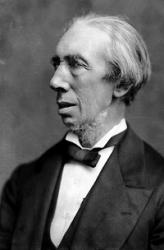Planning worship?
Check out our sister site, ZeteoSearch.org,
for 20+ additional resources related to your search.
- |
User Links
Person Results
Edwin George Monk
1819 - 1900 Person Name: E. G. Monk, 1819-1900 Composer of "GLORIA PATRI (Monk)" in The Book of Praise
Edwin George Monk
H. P. Danks

1834 - 1903 Composer of "[Glory be to the Father, and to the son]" in Gospel Light
H. P. Danks
Richard Farrant
1525 - 1580 Composer of "[Glory be to the Father, and to the Son]" in Hymn and Tune Book of the Methodist Episcopal Church, South (Round Note Ed.) Like many composers of his day, the early years of Richard Farrant’s (c.1525- November 30, 1580) life are not well documented. The first acknowledgment of him is in a list of the Gentleman of the Chapel Royal in 1552. It is assumed from that list that his birth was around 1525. Although, that cannot be accurately determined. During his life he was able to establish himself as a successful composer, develop the English drama considerably, founded the first Blackfriar Theatre, and be the first to write verse-anthems. He married Anne Bower, daughter of Richard Bower who was Master of the Chapel Royal choristers at the time. With Anne he conceived ten children, one of whom was also named, Richard.
As a member of the Gentleman of the Chapel Royal, Farrant was active in ceremonies surrounding the royal family. He began his work with the Chapel Royal around 1550 under the reign of Edward VI. Fortunately, for Farrant, this is a time that saw huge developments in Latin Church Music. Composers like William Byrd and Christopher Tye were busy expanding and elaborating on the Church Music of the day. In Farrant's twelve years with the Chapel Royal, he was able to participate in funerals for Edward VI and Mary I, and coronations for Mary I and Elizabeth I. After his work there, he took up a post as organist at St. George’s Chapel at Windsor.
For Farrant, the post at at Windsor became a permanent one that he retained for the rest of his life. Along with this, he also acquired the position of Master of the Chapel Royal choristers in November of 1569. Having the choirs of both of these institutions at his disposal gave him an outlet to showcase all of his compositions and plays. In fact, every winter he was able to produce a play for the Queen herself. These positions also allowed him to move back to London in 1576 and begin a public theater of sorts where he rehearsed some of his choir music openly. It was soon after, in 1580, that he passed away, having left his house to his wife.
Unlike many composers of his day that stuck to only music composition, Farrant also wrote many plays. One of his most important contributions to drama in England is of course the creation of the first Blackfriars Theatre. This eventually became one of the most important places in London for drama to develop during the Renaissance. Farrant is also one of the earliest and most well known composers that began to mix the two mediums of music and drama. It was this uncommon mixture that allowed him to begin to develop the composition style of 'verse.' This becomes prominent in a lot of his pieces including the anthems "When as we sat in Babylon" and "Call to remembrance" and "Hide not thou thy face."
--en.wikipedia.org/wiki/
Richard Farrant
Walter Greatorex
1877 - 1949 Person Name: W. W. Greatorex Composer of "GLORIA PATRI" in Voice of Praise Walter Greatorex (b. Mansfield, Nottinghamshire, England, 1877; d. Bournemouth, Hampshire, England, 1949) was director of music at Gresham's School, Holt, Norfolk, where from 1911-1936. Before that he served as assistant music master at Uppingham School in Rutland (1900-1910). Greatorex's musical education began as a chorister at King's College, Cambridge, England, and he received his university music training at St. John's College, Cambridge.
Bert Polman
Walter Greatorex
James Turle
1802 - 1882 Person Name: James Turle (1802-1882) Composer of "Gloria Patri (No. 4 Double)" in The Evangelical Hymnal with Tunes TURLE, JAMES (1802–1882), organist and composer, son of James Turle, an amateur 'cello-player, was born at Taunton, Somerset, on 5 March 1802. From July 1810 to December 1813 he was a chorister at Wells Cathedral under Dodd Perkins, the organist. At the age of eleven he came to London, and was articled to John Jeremiah Goss, but he was largely self-taught. He had an excellent voice and frequently sang in public. John Goss [q. v.], his master's nephew, was his fellow student, and thus the future organists of St. Paul's Cathedral and Westminster Abbey were pupils together. Turle was organist of Christ Church, Surrey (Blackfriars Road), 1819–1829, and of St. James's, Bermondsey, 1829–31. His connection with Westminster Abbey began in 1817, when he was only fifteen. He was at first pupil of and assistant to G. E. Williams, and subsequently deputy to Thomas Greatorex [q. v.], Williams's successor as organist of the abbey. On the death of Greatorex on 18 July 1831, Turle was appointed organist and master of the choristers, an office which he held for a period of fifty-one years. Turle played at several of the great musical festivals, e.g. Birmingham and Norwich, under Mendelssohn and Spohr, but all his interests were centred in Westminster Abbey. His playing at the Handel festival in 1834 attracted special attention. At his own request the dean and chapter relieved him of the active duties of his post on 26 Sept. 1875, when his service in D was sung, and Dr. (now Professor Sir John Frederick) Bridge, the present organist, became permanent deputy-organist. Turle continued to hold the titular appointment till his death, which took place at his house in the Cloisters on 28 June 1882. The dean offered a burial-place within the precincts of the abbey, but he was interred by his own express wish beside his wife in Norwood cemetery. A memorial window, in which are portraits of Turle and his wife, was placed in the north aisle of the abbey by one of his sons, and a memorial tablet has been affixed to the wall of the west cloister. Turle married, in 1823, Mary, daughter of Andrew Honey, of the exchequer office. She died in 1869, leaving nine children. Henry Frederic Turle [q. v.] was his fourth son. His younger brother Robert was for many years organist of Armagh Cathedral.
Turle was an able organist of the old school, which treated the organ as essentially a legato instrument. He favoured full ‘rolling’ chords, which had a remarkable effect on the vast reverberating space of the abbey. He had a large hand, and his ‘peculiar grip’ of the instrument was a noticeable feature of his playing. His accompaniments were largely traditional of all that was best in his distinguished predecessors, and he greatly excelled in his extemporaneous introductions to the anthems. Like Goss, he possessed great facility in reading from a ‘figured bass.’ Of the many choristers who passed through his hands, one of the most distinguished is Mr. Edward Lloyd, the eminent tenor singer.
His compositions include services, anthems, chants, and hymn-tunes. Several glees remain in manuscript. In conjunction with Professor Edward Taylor [q. v.] he edited ‘The People's Music Book’ (1844), and ‘Psalms and Hymns’ (S. P. C. K. 1862). His hymn-tunes were collected by his daughter, Miss S. A. Turle, and published in one volume (1885). One of these, ‘Westminster,’ formerly named ‘Birmingham,’ has become widely known, and is very characteristic of its composer.
--en.wikisource.org/
James Turle
C. Meineke
1782 - 1850 Person Name: Charles Meineke Composer of "MEINEKE" in Psalter Hymnal (Gray) Meineke (1782-1850) is referred to by several given names including C., Charles, Christopher, Christoph, and Karl. Meineke apparently left Germany in 1810 and, after spending some time in England, moved to the United States, settling in Baltimore, Maryland, by 1822. He was organist at St. Paul’s Episcopal Church in Baltimore in 1836, likely serving in this position for some eight years.
Meineke published several works including "Music for the Church: Containing Sixty-two Psalm and Hymn Tunes in Four Parts: Together with Chants, Doxologies and Responses for Morning and Evening Prayer, and Holy Communion: Composed for the Use of the Choir of St. Paul's Church, Baltimore" (Baltimore, 1844). He composed the music for Glory Be to the Father and to the Son (MEINEKE).
Source: Danny R. Jones, "Christoph Meineke," Worship Matrix, http://www.worshipmatrix.com/Composerr.php?code=335
C. Meineke
Henry Lawes

1596 - 1662 Person Name: H. Lawes Composer of "GLORIA PATRI" in Songs of Worship Born: January 5, 1596, Dinton, Wiltshire, England.
Died: October 21, 1662, London, England.
Buried: In the cloisters of Westminster Abbey, London, England.
Lawes, tutor to the daughters of the Earl of Bridgewater, is best known as a composer. He became a Gentleman of the Chapel Royal in 1626, and a member of the "King’s Musick" in 1631. He wrote over 400 vocal pieces, as well as anthems and instrumental compositions. His works include:
Choice Psalmes Put into Musick for Three Voices, 1648
Ayres and Dialogues (London: 1653)
Sources:
Frost, p. 680
Hughes, pp. 467-68
Nutter, p. 460
Stulken, p. 292
--www.hymntime.com/tch
Henry Lawes
I. H. Meredith

1872 - 1962 Composer of "[Glory be to the Father, and to the Son]" in Children's Praise No. 1 Pseudonyms
Charles C. Ackley (taken from his wife’s name, Clarissa Ackley Cowan)
Broughton Edwards
Floyd Engle (from his address on Floyd Street in Englewood Cliffs, New Jersey)
Arthur Grantley
Bruce Kennedy
See also Ackley, Chas. C. 1872-1962
See also Edwards, Broughton
I. H. Meredith
Robert Cooke
1768 - 1814 Person Name: Robert Cooke, 1768-1814 Composer of "[Glory be to the Father, and to the Son]" in The Book of Praise
Robert Cooke
George A. Macfarren

1813 - 1887 Person Name: Sir George A. Macfarren Composer of "[Glory be to the Father and to the Son]" in The Chapel Hymnal George Alexander Macfarren, Mus. Doc.; b. London, 1813; d. London, 1887
Evangelical Lutheran Hymnal, 1908
=======================
Born: March 2, 1813, Westminster, England.
Died: October 31, 1887, St. Marylebone, England.
Buried: Hampstead Cemetery, London, England.
Brother of Walter Macfarren, George was a principal of the Royal Academy of Music; professor at Cambridge University; conductor at Covent Garden, London; program note writer for the Philharmonic Society; and editor of Handel and Purcell. He wrote 18 operas, 13 oratorios and cantatas, 9 symphonies, and 162 songs. He went blind in 1860, and was knighted in 1883.
Sources:
Frost, p. 681
Lightwood, p. 189
Nutter, p. 460
http://www.hymntime.com/tch/bio/m/a/c/macfarren_ga.htm
===============================
http://en.wikipedia.org/wiki/George_Alexander_Macfarren
George A. Macfarren


 My Starred Hymns
My Starred Hymns


